Friday, April 21, 2006
Update
This Blog will not be updated for a couple of weeks.
Take care everyone!
Waheguru Ji Ka Khalsa Waheguru Ji Ki Fateh
Thursday, April 20, 2006
Definition of Gursikh and Chardeekala
There are a few words which are overused today by a lot of Sikhs who don't even know what they really mean. Words like Gursikh and Chardeekala.
Mirza Mugammad Harisi, an eye witness to the parade and execution of Amar Shaheed Baba Banda Singh Bahadhur Ji and the other brave sons and daughters of Satguru Sri Guru Gobind Singh Ji Maharaj defines these two words perfectly:
On this day I had gone to see the tamasha (spectacle) as far as the Mandavi-I-Namak (Salt market) and had thence accompanied the procession to the Qilah-I-Mubarik(Imperial Fort). There was hardly any one in the city who had not come out to see the tamasha or to enjoy the show of the extirpation of the accused ones (Sikhs). Such a crowd in the bazaars and lanes had been rarely seen. And the Musalman could not contain themselves for joy.
But those unfortunate Sikhs, who had been reduced to this last extremity, were quite happy and contented with their fate; not the slightest sign of dejection or humility was seen on their faces. In fact, most of them, as they passed along on their camels, seemed happy and cheerful, joyfully singing the sacred hymns of their Scripture.
And, if any one from amongst those in the lanes and bazaars called out to them that their own excesses had reduced them to that condition, they quickly retorted saying that it had been willed by the Almighty and that their capture and misfortune was in accordance with His Will.
And, if any one said, “Now you will be killed,” they shouted, “Kill us. When were we afraid of death? Had we been afraid of it, how could we have fought so many battles with you? It was merely through starvation and for want of food that we fell into your hands, otherwise you know already what deeds we are capable of.
Mirza Muhammad Harisi – Ibrat Nama
Waheguru Ji Ka Khalsa Waheguru Ji Ki Fateh
Wednesday, April 19, 2006
Advise given to Baba Har Rai by Satguru Sri Guru Hargobind Sahib Ji Maharaj
Tuesday, April 11, 2006
Soothing mind cleaning story of submision to the Gurus word
Once upon a time, King Janaka sent a message to the people in his kingdom: "If there be amongst you a great scholar, a Pundit, a Mahatma, a Yogi, a Maharishi, a Sage, whoever he may be, let him come and teach me the knowledge of Atma." In his message he said that he expected to attain Atma Jnana, Self-knowledge, within a matter of a few moments of being properly instructed. Even while climbing onto his horse, before he was completely settled on to it, he should have attained Atma Jnana. He said: "If the person offering to teach me Atma Jnana is not able to accomplish this task of providing me an experience of instant illumination, then I don't want to see him, even if he is the greatest scholar, or the most learned person, or the highly educated person in the land." Well, all the Pundits and Rishis were a little frightened by this requirement. They saw that this would be a severe test on their scholarship and learning, and so none dared to come forth and offer himself to instruct the king and meet the conditions that had been posed.
It was at this point that the boy Astavakra entered the kingdom. While he was going on the road towards the capital city of Mithilapuram, he met a number of people coming from there, including scholars and Pundits; all of them had long faces, looking worried and grief-ridden. Astavakra asked them what was the cause for their worry and grief. They explained to him all the things that had happened. But Astavakra couldn't understand why they should get frightened over such a small thing. He added: "I will gladly solve this problem for the king." So saying he directly entered the court of Janaka. He addressed the king: "My dear King, I am ready to enable you to experience the knowledge of Atma as you desire. But this sacred knowledge cannot be taught so easily. This palace is full of Rajo Guna and Tamo Guna. We must leave this place and enter an area of pure Satva." So, they left the palace and went along the road leading out of the city towards the forest. As was the custom whenever the emperor went outside his palace walls, the army followed behind; but Janaka had them remain outside the forest.
Astavakra and Janaka entered the forest. Astavakra told King Janaka: "I am not going to fulfil your wish unless you accept my conditions. I may be only a boy, but I am in the position of a preceptor; and you may be an all-powerful emperor, you are in the position of a disciple. Are you prepared to accept this relationship? If you agree then you will have to offer the traditional gift to the Guru, the Gurudakshina that is given by the Sishya to the Guru. Only after you give your offering to me will I start my instruction to you." King Janaka told Astavakra: "The attainment of God is the most important thing to me, so I am prepared to give you absolutely anything you want." But Astavakra replied: "I don't want any material things from you, all I want is your mind. You must give me your mind." The king answered: "Alright, I offer my mind to you. Up to now I thought that this was my mind, but from now onwards it will be yours."
Astavakra told Janaka to dismount from his horse and made the horse stand in front of the king and then he told the king to sit down in the middle of the road. Astavakra walked into the forest and sat quietly under a tree. The soldiers waited for a long time. Neither the king nor Astavakra returned from the forest. The soldiers wanted to find out what had happened to them, so one by one, they proceeded to look for them. When they went along the road leading into the forest, they found the king seated there, in the middle of the road. The horse was standing in front of the king. The king had his eyes closed and sat still almost immobile. Astavakra was not to be seen. The officers were afraid that Astavakra might have exercised some magic spell over the king and had made him lose consciousness. The went to look for the Prime Minister.
The Prime Minister came and addressed Janaka: "O King! O King! O King!" But King Janaka did not open his eyes; he did not move at all. The Prime Minister became frightened. Not only the Prime Minister but all the officials were now getting frightened, because the time when the King usually took his food and drink had passed and the king still had not stirred. In this way the day went on and evening came, but the king did not move from his position, sitting there immobile on the road. Left with no alternative, the Prime Minister sent the chariot back to the city to bring the queen thinking that if the queen spoke to the king, he would surely respond. The queen came and addressed the king: "Rajah, Rajah, Rajah!" The king did not stir; there was absolutely no response from the king. Meanwhile the soldiers searched throughout the whole forest for Astavakra. There, under a tree, Astavakra was seated peacefully, in absolute calm and serenity.
The soldiers caught hold of him and brought him towards the place where the king was. Astavakra told them: "Why are you all so worried? The king is safe and everything is alright." But still they insisted and brought him before the King seated on the road with his eyes closed, his body completely still. The soldier said: "Here, look for yourself! See what has happened to the king!". Until that time, whether the Prime Minister, or the ministers, or the queen or any of the other court officials or common people, had called out and addressed the king, he neither opened his mouth in answer nor opened his eyes in acknowledgment. But now Astavakra came and spoke to the king. King Janaka immediately opened his eyes and replied, "Swami!" Astavakra questioned the king: "Well, the ministers have come, and the soldiers have come, and also many others have come, why did you not reply to their entreaties?" Janaka answered: "Thoughts, words and deeds are associated with the mind, and I offered my mind entirely to you. Therefore before I can use the mind for anything, I need your permission. What authority do I have to speak to anyone or use this mind in any way without your permission and command." Then Astavakra said: "You have attained the state of God-realization."
Astavakra told Janaka to put one foot in the stirrup and get up on the horse. By the time he had climbed up and seated himself on the horse and put his other foot in the stirrup, he had attained the experience of Atma.
Waheguru Ji Ka Khalsa Waheguru Ji Ki Fateh
Monday, April 10, 2006
Sheikh Farid Ji's meeting with Guru Nanak Dev Ji Maharaj
Wednesday, April 05, 2006
Kabeer haranaa dhoobalaa eihu hareeaaraa thaal

ਕਬੀਰ ਹਰਨਾ ਦੂਬਲਾ ਇਹੁ ਹਰੀਆਰਾ ਤਾਲੁ ॥
kabeer haranaa dhoobalaa eihu hareeaaraa thaal
Kabeer, the deer is weak, and the
pool is lush with green vegetation.
ਲਾਖ ਅਹੇਰੀ ਏਕੁ ਜੀਉ ਕੇਤਾ ਬੰਚਉ ਕਾਲੁ ॥53॥
laakh ahaeree eaek jeeo kaethaa ba(n)cho kaal 53
Thousands of hunters
are chasing after the soul; how long can it escape death? 53
Bhagat Kabir Ji is using a very beautiful metaphor to explain the reality of this world.
Bhagat Kabeer Ji says that there is a weak deer in a thick forest that has a beautiful pond and green vegetation. Such conditions as described above are every deer’s heaven. What more can a deer ask for but abundance of green vegetation (food for them) and a pond for water?
The next pankiti however adds another dimension to this. Amidst such beautiful atmosphere, the weak deer is being chased by hundreds of thousands of hunters. How long can the deer survive in such atmosphere (kaetha bancho kaal)? Not too long.
Deer is the jeev (jeev-aatma who has taken birth as human) while all the green vegetation and the pond is this world. Thousands of hunters are different kinds of dangers that this jeev faces everyday. How long can this jeev live in this supposedly beautiful world and enjoy the fruits of it? The answer is very short period of time.
Since this jeev is here only temporarily, why should it indulge in the pleasures of this world?
Waheguru Ji Ka Khalsa Waheguru Ji Ki Fateh
Tuesday, April 04, 2006
True Beauty
Lately I have seen alot of posts on forums and blogs about Marriage. The main problem is that alot of us have forgotten what true beauty is. We always describe something as beautiful based on it's external appearance rather than it's internal appearance. The saying "don't judge a book by it's cover" is so true.
Sadly alot of us know this, however we still fall into this trap. May Maharaj open our eyes. I have typed up a sakhi about Sri Guru Har Krishan Sahib Ji Maharaj and a leper, which relates to this. Please take the time to read it:
One day Guru Har Krishan Sahib Ji Maharaj went out on horse back to visit some neighbouring places. People came with simple and humble offerings.
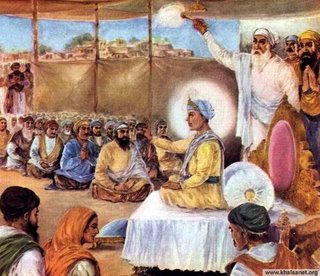
But far apart from everyone stood a man as if he was afraid to come close to Maharaj. He was carrying on his body the dreadful malady, the living death that sucks out the vital fluid from the human body, eats away the joy of life and renders him horrible and loathsome. He was a leper.
Guru Hari Krishan Ji Maharaj looked at him with compassion and friendly sympathy. The young Guru not only carried the burden of human sorrow in his heart but also strength of action and power of healing. In a gesture of bestowing his loving mercy on the leper he placed his hand on his head, bent low by humiliating suffering.
He spoke to him with such deep concern and sympathy, that the leper was amazed at the gentleness and grandeur of Guru Sahib's compassion and concern for him. For the first time in his life he heard anyone having some faith in the hidden dignity of his soul. Guru Ji's words awakened a new consciousness and a new power within him.
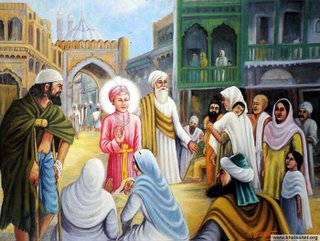
On meeting and seeing the radiant face of Guru Ji, who was bringing with warmths and mercy for him, he felt he had changed from within. He regained his inner strength, confidence and will to live with his face turned away from the darkness of life. He felt that he was only a wounded soldier who had allowed his wounds to become festering sore.
The malady had made him forget that he was a soldier in the battlefield of life and he must fight for glory and victory without caring for his body. Now God had sent him the Supreme Healer, who had within him an infinite power to cure the moral, spiritual and physical deformities of men like him. The leper felt greatly exalted morally and spiritually. His inherent virtues of humility, and the courage to suffer with patience now became sources of strength, He felt greatly relieved when Guru Har Krishan assured him that he had a beautiful soul.
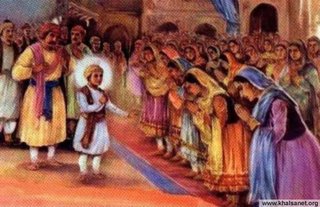
And now, when that soul was filled with the Light of Divine Power, the leper felt and visibly saw that many people who were dressed in glamorous clothes, and were physically attractive outwardly were plagued with unbelief, cowardice, selfishness, cruelty. He was much better than these sinful and distorted souls. With his awakened consciousness, he could see many people in robust health slowly dying with cancerous maladies in their souls. The new fount of spiritual power opened within his heart discharged a new healing energy, with which his leprosy began to heal and disappear.
 Kavi Santokh Singh writes: "Guru Har Krishan dispelled people's sorrows, fulfilled their ambitions, imparted to the Light of True Name of God, He erased evil from the mind of the people and inspired them with patience righteousness and charity. Thus Sikhism flowered and illumined the hearts of the seekers. From distant lands devotees came to seek his benediction and healing touch. He cheered them up and removed their affliction."
Kavi Santokh Singh writes: "Guru Har Krishan dispelled people's sorrows, fulfilled their ambitions, imparted to the Light of True Name of God, He erased evil from the mind of the people and inspired them with patience righteousness and charity. Thus Sikhism flowered and illumined the hearts of the seekers. From distant lands devotees came to seek his benediction and healing touch. He cheered them up and removed their affliction." Waheguru Ji Ka Khalsa Waheguru Ji Ki Fateh
Waheguru Ji Ka Khalsa Waheguru Ji Ki Fateh
Monday, April 03, 2006
"Our work in this world has to be much bigger than ourselves"
One militant affiliated with the Khalistan Liberation Force took a typically universalist view of the Sikh struggle for justice when he pointed to a portrait ofGuru Tegh Bahadur, the ninth Guru, who was said to have been martyred for the right of Hindus to worship freely:
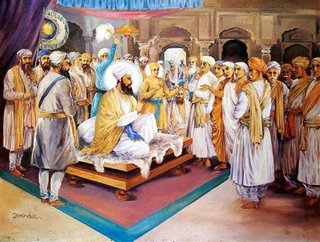 That's Guru Tegh Bahadur. His story is so beautiful, because he sacrificed his life for the sake of another religion, for Hindus. At that time they were being persecuted by the Mughals. That's really an inspirtation to me.
That's Guru Tegh Bahadur. His story is so beautiful, because he sacrificed his life for the sake of another religion, for Hindus. At that time they were being persecuted by the Mughals. That's really an inspirtation to me.
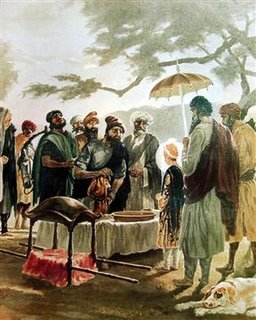 That's why I think Sikhs are in the world, not just for Sikhs alone but for anybody who needs a Sikh. Honestly, deep in my heart I feel like our work in this world has to be much bigger than ourselves.
That's why I think Sikhs are in the world, not just for Sikhs alone but for anybody who needs a Sikh. Honestly, deep in my heart I feel like our work in this world has to be much bigger than ourselves.
Some of my friends say when Khalistan is established then we'll be able to kick back and relax! But I say no, the work is just getting started. You have your country but then you need to work on achieving justice in it and then in the rest of the world.
All these wars that are going on today, people are demanding justice at all costs. Bosnia is a clear-cut case. We have to not only be more peaceful in spirit, but we have to be willing to sacrifice our lives. The United Nations doesn't really have any power because there aren't enough parents willing to sacrifice their sons. It's all just a big hoopla.
If there is injustice and somebody in Somalia isn't getting food, the United Nations should be able to take care of it. When Khalistan is established if I have any say I will send 500, 1,000, 5,000 Sikhs right away. You don't get peace and justice without sacrifice and our Gurus taught us all about that.
Taken From: Fighting for Faith and Nation by Cynthia Keppley Mahmood
Waheguru Ji Ka Khalsa Waheguru Ji Ki Fateh
Saturday, April 01, 2006
feel rabaabee baladh pakhaavaj kooaa thaal bajaavai
This Shabad is by Bhagat Kabeer Ji in Raag Aasaa on Ang 477
Waheguru Ji Ka Khalsa Waheguru Ji Ki Fateh